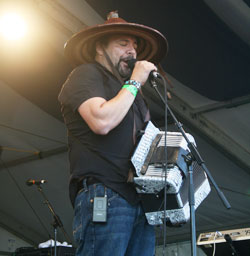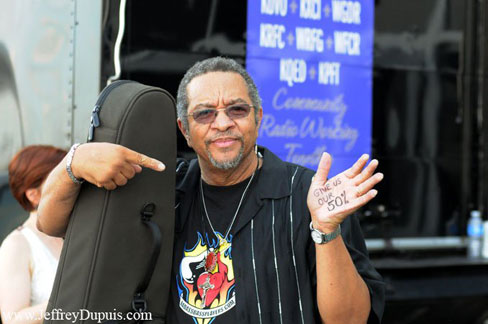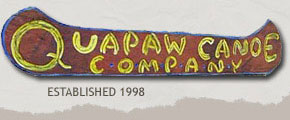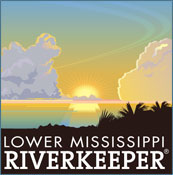June 2010 message from Voice of the Wetlands
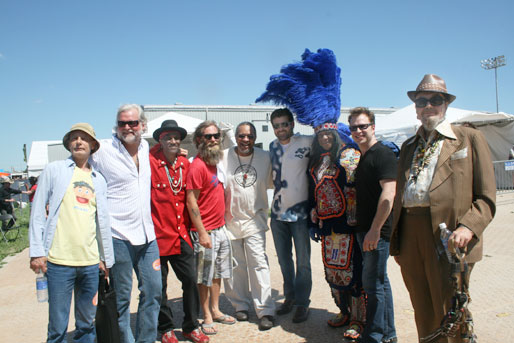
Voice Of The Wetlands,"NO COMMENT!""YET!", L-R, Johnny Vidacovich, Jumpin Johnnie Sansone, Cyril Neville, Anders Osbourne, George Porter, Tab Benoit, BigChief Monk Boudreaux, Stanton Moore, & Dr John backstage at the Acura stage, Jazzfest 2010. At presstime the VOW pretty much were so pissed off that they have nothing to say that we could print so George Porter gave us a few comments and Gaynielle Neville (Cyril's wife) gave us a new song she wrote and we pray for OUR gulf and our fellow Americans!
Terrance Simien on the BP oil spill: "It's terrible. Last summer I leff out of Port Fourchon to go fishing with my friend Ray. I love the outdoors and it was amazing to see the abundance of fish in the Gulf only 60 miles off the coast. They were everywhere and it's awful to think this could be the end of Gulf seafood. With 40,000 wells being drilled it's hard to imagine that one well can cause this much damage. We will be doing a fund raised for the state on Grand Isle next month and I hope we can make some small contribution to the people of this area who are losing so much "
“If you are going to keep drilling in the Gulf of Mexico then the United States needs to give us our 50%” — George Porter
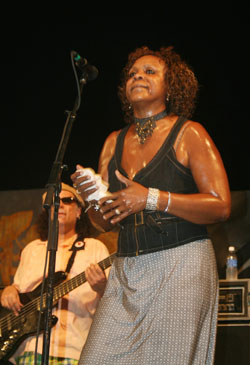
Gaynielle Neville at Jazzfest with Tribe13.
Poisoning Our Waters
A Song by Gaynielle H. Neville
Hey big shots you’re so crazy for oil
Making big profits while the waters you spoil
Killing every creature on land and in the sea
It is definitely no surprise to me
That you will lie, cheat & steal
You try to hold our necks under your feet
Creating misery behind your desk in your seat
While you smoke your big cigar
Some people can’t eat
Big man, big plan causing our defeat
While you poisoning our waters.....
So what you think you doing...
Those big bucks that you are pursuing...
Is it enough you’ve gone and lost your soul....
Just to have big oil control....
Hey politicians how much were you bought for?
You jeopardize lives as you try to ignore
Dying animals washing up on the shore
Just so you can have so much more
So you would lie cheat and steal
Big donations while you look away
As soon as elected you don’t do what you say
Should be asking for forgiveness even if you don’t
pray
Beggin to be shown a better way
You let them Poison our waters.....
Black Tide Report
May 29, 2010
Report from John Ruskey, Quapaw Canoe Company:
A biologist friend of mine flew over the Chandeleur Islands yesterday and said that even with oil globs washing ashore by far the worst visible devastation to these critical barrier islands are the canals previously cut by all oil companies exploring & maintaining the many thousands of wells scattered along the coastline. These canals and surrounding construction earthworks are destroying the sensitive marshlands and brackish water areas that are critical habitat and protect the land from storm surges and hurricane-generated waves.
This brings home the fact that if you really want to help make things better you need to start at home. Drive less and walk more. Ride your bicycle. Avoid plastic products (which are made from petroleum). Conserve energy. Outfit your house with alternative sources of energy like wind & solar. Think globally act locally. Think of the Gulf each time you start your car engine or flood your home with light, or change the thermostat on a hot summer’s day. We are all complicit in this spill. America’s insatiable appetite for cheap energy is killing the Gulf Coast. You can boycott BP (which some people are doing) but at the same time you might as well be boycotting all gas companies and opting for conservation and alternative energy. Oil companies will listen only when the bottom line declines because less fuel is being consumed. Remember, we are all creating the market for oil.Things are bad, that’s obvious by what’s coming to shore. Marine life such as dolphins, sea turtles and other amphibians & fish are washing up on beaches. Important birding habitat is increasingly being infected. But what’s worse is what you can’t see. What’s accumulating underwater or far out to sea will be washing up for months maybe years to come and will have unforeseen long-term effects on the entire biota of the greater Gulf. The Gulf currents are capable of carrying oil contamination to all areas of the Gulf of Mexico, and then around the tip of Florida and up the Gulf Stream to the Atlantic States. Who knows, possibly beyond. The size of this spill is beyond the comprehension of scientists who are used to small spills in shallow waters.
How to help on the Gulf? See below a list of the people and organizations who are actively involved in documenting and protecting the Gulf Coast and its surrounding water-ways. BP is overseeing the cleanup, so you have to go through their recruitment process if you want to volunteer for the hands-on cleanup. www.gulfoilspilljobs.com But you can also volunteer for Audubon or other organizations and let them tell you where help is needed most. All organizations could use your monetary donations and long-term support. Go to their websites and see who makes the most sense to you, and help them out.
If you’re concerned about animals, go to the National Wildlife Federation.
For birds, the National Audubon Society
LEAN the Louisiana Environmenal Action Network -- has been helping protect Louisiana residents for decades from the environmental abuses of big oil companies.
Gulf Resortation Network
The Lower Mississippi Riverkeeper for the mouth of the Mississippi River & surrounding Deltas. Sign up for their newsletter for the inside story & scientific reports not found anywhere else.
For the Atchafalaya River & Delta, The Atchafalaya Basinkeeper. The Atchafalaya is America’s largest river swamp and sustains many important estuaries and bay areas, fishing grounds west of the mouth of the Mississippi. It’s the only place in the State of Louisiana where an outflowing river system has been allowed to naturally flow into the Gulf end result: sedimentation & creation of marshlands & barrier islands.
Louisiana Bayoukeeper.
Mobil Baykeeper.
Below the Surface early on sent its ground team to the Gulf. Sign up for their Water News Network for up-to-date stories & information you might not find elsewhere.
The River Will Provide -- Oil Flow Disaster in the Gulf of Mexico Has Created the Opportunity to Restore Coastal LouisianaPosted: 27 May 2010 10:08 PM PDT
I knew a worst-case scenario was unfolding as soon as I heard that the Deepwater Horizon rig blew over one month ago. True to our namesake, we quickly discovered that there is a lot going on below the surface. A growing consensus among scientists estimates that over one hundred million gallons of oil have poured into the Gulf of Mexico so far. Oil booms are ineffective, dispersants are creating a toxic-stratified chemical cocktail throughout the Gulf of Mexico, and BP is still calling the shots while simultaneously dropping the ball.
Our exploration team, from Below the Surface, had plans for a cordial rendezvous with our friends and partner organizations in Louisiana as a follow-up to an expedition we launched down the Atchafalaya River this past February, which is chronicled in the June/July issue of Reader's Digest Instead we found ourselves in a much different scenario--defense as opposed to offense. As our crew motored in the warm, turquoise waters off the Gulf Coast National Seashore, a National Park, with a pod of 20+ bottle-nosed dolphins, I knew that their fate had been sealed. I did all I could to keep my tears hidden from the other guys onboard behind my aviator sunglasses. The damage has been done; we need to recognize that the disaster has occurred! When I first arrived, I expected to see scores of oiled-birds being taken to the triage centers and thick goo lapping up on the beaches--I was conditioned to the images of the Exxon-Valdez spill.However, this travesty is completely different from the one that occurred in Alaska over twenty-years ago. That was a spill of a finite amount. This is still flowing, and marine life is taking the brunt of the impact. We've found dead dolphins and dead sea turtles and countless jellyfish (a staple for sea turtles) washing up everywhere despite the fact that the alluring greenish-blue waters and white-sand beaches appeared to be clean. This makes the dispersants a prime culprit. The dispersants in and of themselves are toxic, and the compounds they create when interacting with oil make them even more toxic. Worse yet, dispersants spread oil throughout water column contaminating a higher percentage of the ocean instead of concentrating oil on the surface.
It is fairly safe to say that most containment methods have been for aesthetic purposes. Oil continues to flow, and BP's several attempts at containment have all failed. The contingency techniques and their names offer little assurance: top hat/top kill, junk shot, and insertion. How about a shot in the dark? After all, that's exactly what this is. BP has repeatedly claimed that this type of recovery operation has never been done in 5,000 feet of water. Why then were they allowed to take such a calculated risk by scraping the bottom by the barrel for oil without a response strategy?
Had we invested more in our oceans, this travesty may have been averted or quickly resolved. On the contrary, we know very little about our oceans; in fact, about 90% of our oceans remain unexplored. It is disturbing to think that we have better maps of Mars than of our own oceans. NOAA and other marine exploration institutions are desperately underfunded relative to other fields. For instance, NASA's annual budget would fund NOAA's budget to explore our oceans for 1,600 years. It is time to focus on the reality of issues faced by our planet and America's waterways.
Many feel that this disaster has been worse than Katrina, and the impacts will be felt for a much longer period of time. This man-made disaster has been and will be destructive to the Louisiana coastline for the exact same reasons as Hurricane Katrina--the vanishing wetlands.
What's the Solution?This solution runs parallel to the discoveries we made while underway on the Atchafalaya expedition, dubbed Gaining Ground. Louisiana loses about one football field of land every hour, which equates to land loss of about 30 square miles per year and is approximately 2,300 square miles since 1930 gone! This is because the highly managed, dredged, and leveed Mississippi River no longer provides sediment to replenish coastal wetlands. In contrast, we found that the Atchafalaya River has the only two growing deltas in Louisiana. This is because the river is allowed to exist in a more natural state and sediment slows down and settles to form new coastal marshland known as accretion (the opposite of erosion).
When we leveed rivers, we lost the resiliency of the entire area; the best thing we can do is open up substantial and strategically placed diversions that flow around 100,000 cubic feet per second to provide the sediment necessary for rebuilding the coast. The river can do the work for us and reverse the damage done relatively quickly!The hasty, man-made creation of barrier islands off the coast is panic-based, not science-based and may be more destructive to the coast long-term. I spoke with a number of leaders spearheading Gulf Coast conservation efforts and they believe that dredged up barrier islands will be expensive and will fail. They will certainly fail from a hurricane surge and hurricane season begins the first of June. Selectively breaching the levees to let the Mississippi River naturally reconstitute the wetlands is likely cheaper and offers a permanent benefit. Seemingly irreparable damage to wetland marshes has ensued, but nature will rebuild if we rebuild the natural conditions that make it all possible.
With all of the conservation work going on in the Gulf Coast, it seems to me that if it were easy to just build these islands, it would have been done decades ago. Repairing this disaster is beyond our control; the Mississippi River brings over 200,000 dump-truck loads of sediment to the Gulf of Mexico every day. Unfortunately most of that is sent over the continental shelf. We need to match power with power by following nature's model; the river will provide!
To minimize collateral damage, we must stop the use of any and all dispersants. Our public servants must raise the liability cap retroactively and through the roof! In addition, politicians should pass the Bingaman Baucus Senate Bill to provide $900 million per year for conservation from oil revenues. To guarantee transparency within the Unified Command we must create an NGO Representative position to serve as an ombudsman to for a more coordinated front of the well-established and experienced groups in the area. Last, but certainly not least, it would be prudent to focus on the often-overlooked issue of actually stopping the oil flow instead of allowing BP to try to salvage the well.
Southern HospitalityI returned to the south to help my friends from various organizations and universities because of the care and generosity they have shown me. I believe that they are conditioned to be so hospitable because they are survivors. The ever-giving people in the South are in need of help. Despite all of the adversity bestowed upon the South our fellow Americans are in trouble, their true voices are not getting heard, the truth is not being revealed, and there are still a lot of questions that remain unanswered.
Remember, the only way to solve an environmental disaster is to work with nature. In the words of my dear friend and legendary outfitter and guide, John Ruskey, "May the river be with you."
Kristian Anders Gustavson, Co-Founder of Below the Surface.Summer Of Tears
by Mike Roberts. Louisiana BayoukeeperThe boat ride, out, from Lafitte, Louisiana, Sunday, May 23, 2010, to our fishing grounds was not unlike any other I have taken in my life, as a commercial fisherman from this area. I have made the trip thousands of times in my 35 plus years shrimping and crabbing. A warm breeze in my face, it is a typical Louisiana summer day. 3 people were with me, my wife Tracy, Ian Wren, and our grandson, Scottie. I was soon to find out, how untypical this day would become for me, not unlike a death in the family. This was going to be a very bad day for me.
As we neared Barataria Bay, the smell of crude oil in the air was getting thicker and thicker. An event that always brought joy to me all of my life, the approach of the fishing grounds, was slowly turning into a nightmare. As we entered Grand Lake, the name we fishermen call Barataria Bay, I started to see a weird, glassy look to the water and soon it became evident to me, there was oil sheen as far as I could see. Soon, we were running past patches of red oil floating on top of the water. As we headed farther south, we saw at least a dozen boats, in the distance, which appeared to be shrimping. We soon realized that shrimping was not what they were doing at all, but instead they were towing oil booms in a desperate attempt to corral oil that was pouring into our fishing grounds. We stopped to talk to one of the fishermen, towing a boom, a young fisherman from Lafitte. What he told me floored me. He said, "What we are seeing in the lake, the oil, was but a drop in the bucket of what was to come." He had just come out of the Gulf of Mexico and he said, "It was unbelievable, the oil runs for miles and miles and was headed for shore and into our fishing grounds". I thought, what I had already seen in the lake was enough for a lifetime. We talked a little while longer, gave the fisherman some protective respirators and were soon on our way. As we left the small fleet of boats, working feverishly, trying to corral the oil, I became overwhelmed with what I just saw.
I am not real emotional and consider myself a pretty tough guy.You have to be to survive as a fisherman. As I left that scene, tears flowed down my face and I cried. Something I have not done in a long time, but would do several more times that day. I tried not to let my grandson, Scottie, see me crying. I didn't think he would understand, I was crying for his stolen future. None of this will be the same, for decades to come. The damage is going to be immense and I do not think our lives here in South Louisiana will ever be the same. He is too young to understand. He has an intense love for our way of life here. He wants to be a fisherman and a fishing guide when he gets older. It is what he is, it is in his soul, and it is his culture. How can I tell him that this may never come to pass now, now that everything he loves in the outdoors may soon be destroyed by this massive oil spill? How do we tell this to a generation of young people, in south Louisiana who live and breathe this bayou life that they love so much, could soon be gone? How do we tell them? All this raced through my mind and I wept.
We continued farther south towards Grand Terre Island. We approached Bird Island. The real name is Queen Bess Island, but we call it Bird Island, because it is always full of birds. It is a rookery, a nesting island for thousands of birds, pelicans, terns, gulls etc. As we got closer, we saw that protective boom had been placed around about two thirds of the island. It was obvious to me, that oil had gone under the boom and was fouling the shore and had undoubtedly oil some birds. My God. We would see this scene again at Cat Island and other unnamed islands that day. We continued on to the east past Coup Abel Pass and more shrimp boats trying to contain some of the oil on the surface. We arrived at 4 Bayou Pass to see more boats working on the same thing. We beached the boat and decided to look at the beach between the passes.
The scene was one of horror to me. There was thick red oil on the entire stretch of beach, with oil continuing to wash ashore. The water looked to be infused with red oil, with billions of, what appeared to be, red pebbles of oil washing up on the beach with every wave. The red oil pebbles, at the high tide mark on the beach were melting into pools of red goo in the hot Louisiana sun. The damage was overwhelming. There was nobody there to clean it up. It would take an army to do it. Like so much of coastal Louisiana, it was accessible only by boat. Will it ever be cleaned up? I don't know. Tears again. We soon left that beach and started to head home.
We took a little different route home, staying a little farther to the east side of Barataria Bay. As we approached the northern end of the bay, we ran into another raft of oil that appeared to be covering many square miles. It was only a mile from the interior bayous on the north side of Barataria Bay. My God. No boats were towing boom in this area. I do not think anyone even knew it was there. A little bet farther north, we saw some shrimp boats with boom, on anchor, waiting to try and protect Bayou St. Dennis from the oil. I alerted them of the approaching oil. I hope they were able to control it before it reached the bayou. We left them and started to head in.
My heart never felt so heavy, as on that ride in. I thought to myself, this is the most I've cried since I was a baby. In fact I am sure it was. This will be a summer of tears for a lot of us in south Louisiana. — Michael Roberts
Louisiana Bayoukeeper, IncYou can find Notes From The Louisiana Bayoukeeper here:
http://lmrk.org/notes-from-the-louisiana-bayoukeeper/
Home
/ Blues Views /
Artist Links / Blues Links
/ Videos / Store
/ Subscribe / Advertise
/ Back Issues
/ Contact / Staff

